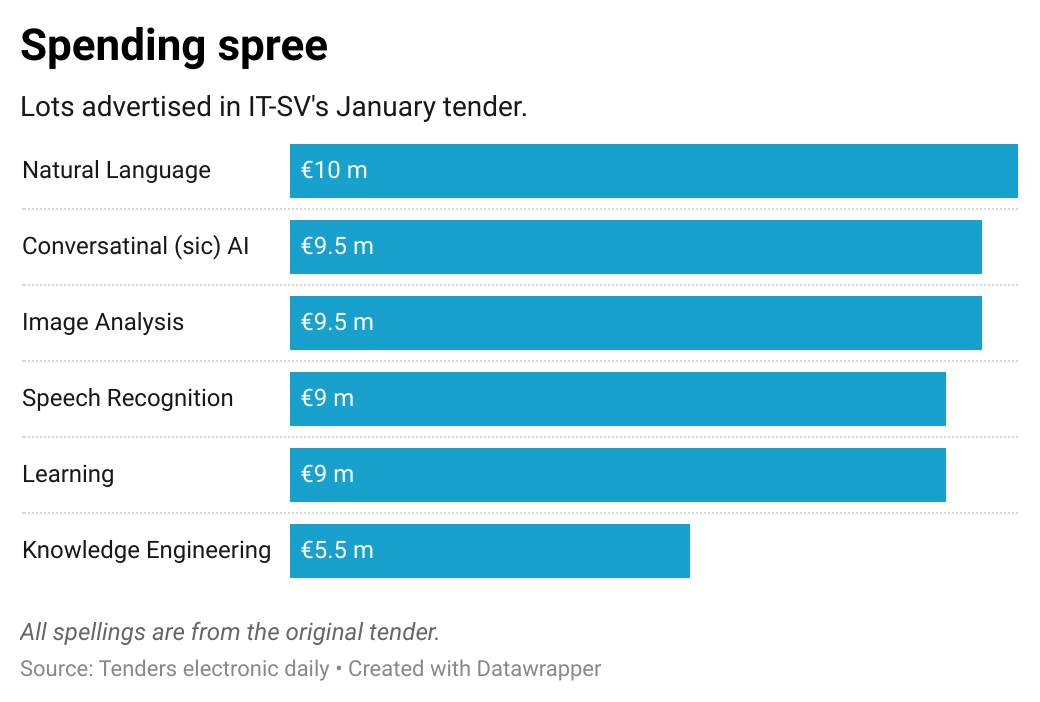Austria’s social security invests over €50m in AI – just for bookkeeping?
The company that manages the technical infrastructure of Austria’s health insurance system passed a massive tender for AI services. The plan is shrouded in secrecy, even though the company’s track record urges caution.

At first glance, “IT-Services der Sozialversicherungen GmbH” (IT-SV) is just another software company. Few people ever heard of it, even in their home country of Austria. But IT-SV is not just another software company. It maintains the software for almost all Austrian social security services and claims to look after 8,800,000 beneficiaries – in a country of 9,030,000 inhabitants.
In December, IT-SV requested bids for an array of services including speech recognition, chatbots, image analysis, and more. In total, IT-SV plans to invest €52.5m in Artificial Intelligence.

Companies are required to prove their access to experienced personnel in a number of fields and will be judged by the daily rates they would charge. Applicants need to name a number of developers, data scientists, and architects per lot they apply for. There is no mention of concrete projects in the tender, or any supplemental pieces of information.
A second tender aimed at “creating a dynamic procurement system for AI” was published at the same time with no value estimate. It provides some clarity on the potential goals of the first tender by giving two areas for use cases as examples: bookkeeping services such as automatic parsing and invoice checks, as well as forecasting, for example to identify cost drivers for insurance companies.
AlgorithmWatch tried to contact IT-SV to obtain more details about the intended use areas (why would IT-SV need a 9-million-euro chatbot for bookkeeping?) or the calculations that led to the estimate of the project’s costs. Multiple emails to the address provided for press requests were not answered. The phone number on the website for press inquiries isn’t helpful either. Our call wasn’t actually answered by a contact person from the press department but just by an operator. Pressed with a last, confrontational email, they declined to comment, citing a policy of not commenting on ongoing tenders – even though the deadline for offers had already passed.
(We could not file freedom of access requests as Austria’s freedom of information law, which was passed in January and would allow requests to such companies, will only come into force in 2025.)
Austria's largest health insurer ÖGK (“Österreichische Gesundheitskasse”), which owns part of IT-SV and is named in the tenders as one potential customer for bidders, declined to comment and asked AlgorithmWatch to direct questions to the (unresponsive) IT-SV. Concrete questions about IT-SV systems deployed at ÖGK were not answered.
Move fast and break things
Austria’s social services are no strangers to Machine Learning. At least two previous projects by IT-SV have already been deployed. In December 2019, they introduced an automated document classifier at ÖGK that forwards emails from insured people to the responsible departments based on their text and attachments. IT-SV also received €2.8m for the “KAI system,” a project aiming to speed up the reimbursement process for treatments by doctors not in contract with the health insurance. According to the largest health insurers’ annual report, two thirds of reimbursement requests were processed semi-automatically in October 2022.
Many in Austria doubt that KAI did speed up reimbursements. A patient reported to the newspaper Kurier that he sent 15 invoices in 2021, and was reimbursed within 27 days on average. In 2023, based on 17 invoices, he was reimbursed after 54 days. A spokesperson for ÖGK explained the delay by saying that the system was based on Machine Learning and, therefore, was still learning.
Other public services in Austria deployed Artificial Intelligence at scale with controversial results. The employment agency launched a LLM-based chatbot called “Berufsinfomat” in January. It suggests users to ask questions such as “How do I become a programmer” or “I find police officers interesting! What are the requirements?”. A software developer found that it discriminates against women if users disclose their gender in their prompts. The same agency previously attempted to introduce an algorithm that categorized job seekers based on the likelihood that they would find a job. A data analysis (no Machine Learning involved) showed that it down-ranked women because past data indicated that they were less likely to be in employment. The Austrian employment agency saw no problem with this logic, but refrained from deploying the algorithm after a civil society outcry.